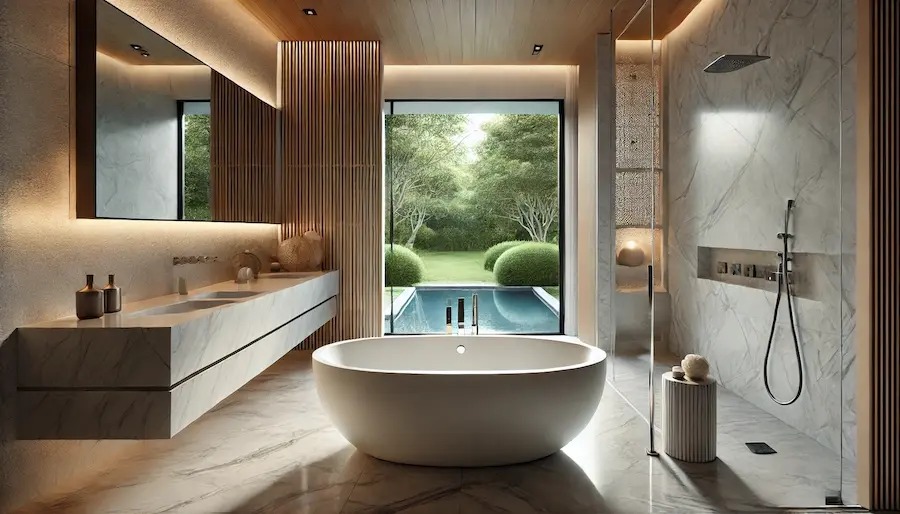A freestanding tub serves as a striking centerpiece in bathroom design, offering both aesthetic appeal and functional benefits.
Key Features of Freestanding Tubs
- Design Versatility: Available in various shapes, sizes, and materials, freestanding tubs can complement diverse interior styles, from classic clawfoot designs to sleek, modern silhouettes.
- Placement Flexibility: Unlike built-in tubs, freestanding models can be positioned anywhere space allows, providing creative freedom in bathroom layouts.
- Soaking Depth: Many freestanding tubs are designed with deeper basins, enhancing the soaking experience for users.
Pros and Cons of Freestanding Tubs
Pros:
- Aesthetic Appeal: Freestanding tubs act as a focal point, elevating the bathroom’s visual appeal.
- Installation Ease: Generally, they require simpler installation compared to built-in tubs, as they don’t need to be enclosed within a structure.
- Design Variety: With numerous styles and materials available, homeowners can select a tub that aligns with their personal taste and bathroom decor.
Cons:
- Space Requirements: Freestanding tubs typically demand more space, which may not be suitable for smaller bathrooms.
- Cost Considerations: They are often more expensive than built-in tubs, both in terms of the fixture itself and potential installation complexities.
- Cleaning Challenges: Cleaning around and beneath the tub can be more demanding, especially if it’s placed away from walls.
Design Inspirations for Freestanding Tub Bathrooms
- Modern Minimalism: A sleek, oval-shaped tub placed against a backdrop of neutral-toned tiles creates a serene and contemporary atmosphere.
- Vintage Elegance: Incorporating a clawfoot freestanding tub with classic fixtures can evoke a timeless, luxurious feel.
- Natural Retreat: Positioning a freestanding tub near large windows or within a ‘wet room’ setup can enhance the bathing experience by integrating natural light and views.
Considerations When Choosing a Freestanding Tub
- Bathroom Size: Ensure the space can comfortably accommodate the tub without compromising functionality.
- Weight and Flooring: Some freestanding tubs, especially those made of materials like cast iron, can be quite heavy and may require reinforced flooring.
- Plumbing and Fixtures: Decide between floor-mounted, wall-mounted, or deck-mounted faucets, considering both aesthetics and practicality.
Conclusion
Integrating a freestanding tub into your bathroom design can transform the space into a luxurious retreat. By carefully considering the style, placement, and practical aspects, you can create a harmonious and functional environment that reflects your personal taste.
